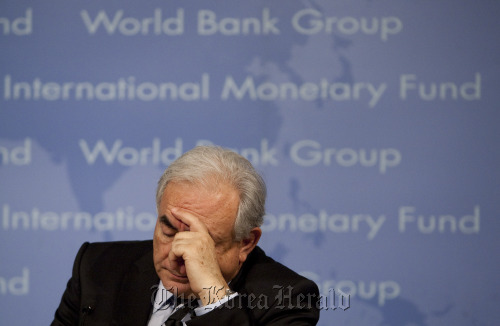WASHINGTON (AFP) ― The IMF ignored warnings about the financial crisis from its own top economist and acted like cheerleader for the U.S. economy rather than monitoring it, according to a scathing watchdog report published on Wednesday.
The International Monetary Fund “failed to highlight the relevant vulnerabilities” in the U.S. financial system in the run up to the 2008 crisis, according to a 51-page report from the fund’s Independent Evaluation Office.
Despite a 2005 warning from the IMF’s chief economist Raghuram Rajan about the same complex financial products that would plunge the globe into crisis, little was done to act on those warnings, the watchdog said.
“Despite the importance of the economic counselor’s position, there was no follow up on Rajan’s analysis and concerns ― his views did not influence the IMF’s work program.”
 |
Dominique Strauss-Kahn, managing director of the International Monetary Fund. (Bloomberg) |
In contrast, the watchdog claimed the IMF “often seemed to champion the U.S. financial sector and the authorities’ policies, as its views typically paralleled those of the U.S. Federal Reserve.”
The report is a damning criticism of the Washington-based body, which, as part of its mandate, monitors economies around the globe and frequently warns of looming risks.
“The banner message was one of continued optimism after more than a decade of benign economic conditions and low macroeconomic volatility.”
“The belief that financial markets were fundamentally sound and that large financial institutions could weather any likely problem lessened the sense of urgency to address risks or to worry about possible severe adverse outcomes.”
The IMF, it said, could have taken steps to improve surveillance, for example by including developed economies in programs adopted after the Asian financial crisis more than a decade earlier.
“Advanced economies were not included in the vulnerability exercise launched after the Asian crisis, despite internal discussions and calls to this effect from board members and others.”
The IMF was also criticized for a narrow analytical approach and for staff “operating in silos” that led to a failure to “connect the dots.”
“The silo behavior is a long-standing problem; and it occurs between departments, within departments, within divisions, and even within management.”
Since the financial crisis began the IMF has seen its power increase. It has become an emergency backstop for countries from Mexico to Poland, and has bailed out others, most notably Greece and Ireland.
IMF managing Director Dominique Strauss-Kahn offered qualified support for the report.
He said the IMF has been frank about its failures in the run up to the crisis, which he described as “humbling.”
He added that reforms were already underway to improve surveillance.
“The focus of the reform agenda being implemented is precisely on strengthening surveillance and financing for systemic stability.” he said.
Strauss-Kahn took the helm of the IMF in 2007.







![[Today’s K-pop] Blackpink’s Jennie, Lisa invited to Coachella as solo acts](http://res.heraldm.com/phpwas/restmb_idxmake.php?idx=644&simg=/content/image/2024/11/21/20241121050099_0.jpg)
